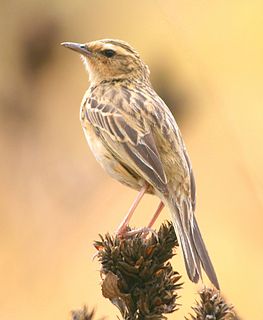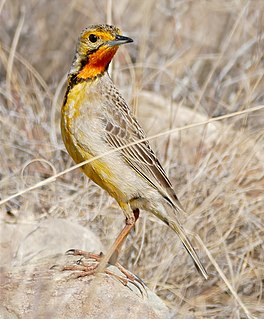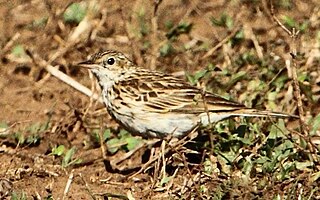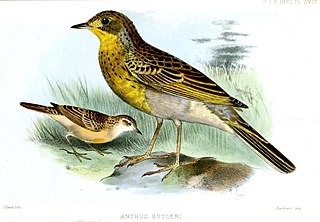
The wagtail is a genus, Motacilla, of passerine birds in the family Motacillidae. The forest wagtail belongs to the monotypic genus Dendronanthus which is closely related to Motacilla and sometimes included therein. The common name and genus names are derived from their characteristic tail pumping behaviour. Together with the pipits and longclaws they form the family Motacillidae.

The white wagtail is a small passerine bird in the family Motacillidae, which also includes pipits and longclaws. The species breeds in much of Europe and the Asian Palearctic and parts of North Africa. It has a toehold in Alaska as a scarce breeder. It is resident in the mildest parts of its range, but otherwise migrates to Africa. In Ireland and Great Britain, the darker subspecies, the pied wagtail or water wagtail predominates. In total, there are between 9 and 11 subspecies.

The pipits are a cosmopolitan genus, Anthus, of small passerine birds with medium to long tails. Along with the wagtails and longclaws, the pipits make up the family Motacillidae. The genus is widespread, occurring across most of the world, except the driest deserts, rainforest and the mainland of Antarctica.

The wagtails, longclaws and pipits are a family, Motacillidae, of small passerine birds with medium to long tails. There are around 65 species in 6 genera. The longclaws are entirely restricted to the Afrotropics, and the wagtails are predominantly found in Europe, Africa and Asia, with two species migrating and breeding in Alaska. The pipits have the most cosmopolitan distribution, being found across mostly in the Old World but occurring also in the Americas and oceanic islands such as New Zealand and the Falklands. Two African species, the yellow-breasted pipit and Sharpe's longclaw, are sometimes placed in a separate seventh genus, Hemimacronyx, which is closely related to the longclaws.

The longclaws are a genus, Macronyx, of small African passerine birds in the family Motacillidae.

The western yellow wagtail is a small passerine in the wagtail family Motacillidae, which also includes the pipits and longclaws.

The European rock pipit, or just rock pipit, is a species of small passerine bird that breeds in western Europe on rocky coasts. It has streaked greyish-brown upperparts and buff underparts, and is similar in appearance to other European pipits. There are three subspecies, of which only the Fennoscandian form is migratory, wintering in shoreline habitats further south in Europe. The European rock pipit is territorial at least in the breeding season, and year-round where it is resident. Males will sometimes enter an adjacent territory to assist the resident in repelling an intruder, behaviour only otherwise known from the African fiddler crab.

The water pipit is a small passerine bird which breeds in the mountains of Southern Europe and the Palearctic eastwards to China. It is a short-distance migrant; many birds move to lower altitudes or wet open lowlands in winter.

The paddyfield pipit or Oriental pipit is a small passerine bird in the pipit and wagtail family. It is a resident (non-migratory) breeder in open scrub, grassland and cultivation in southern Asia east to the Philippines. Although among the few breeding pipits in the Asian region, identification becomes difficult in winter when several other species migrate into the region. The taxonomy of the species is complex and has undergone considerable changes.

The forest wagtail is a medium-sized passerine bird in the wagtail family Motacillidae. It has a distinctive plumage that sets it apart from other wagtails and has the habit of wagging its tail sideways unlike the usual up and down movements of the other wagtail species. It is the only wagtail species that nests in trees. They are found mainly in forested habitats, breeding in the temperate parts of east Asia and wintering across tropical Asia from India to Indonesia.

The Cape longclaw or orange-throated longclaw is a passerine bird in the family Motacillidae, which comprises the longclaws, pipits and wagtails. It occurs in Southern Africa in Zimbabwe and southern and eastern South Africa. This species is found in coastal and mountain grassland, often near water.

Sharpe's longclaw is a passerine bird in the longclaw family Motacillidae, which also includes the pipits and wagtails. It is endemic to Kenya.

The golden pipit is a distinctive pipit of dry country grassland, savanna and shrubland in eastern Africa. It is native to Ethiopia, Kenya, Somalia, South Sudan, Tanzania and Uganda, and has occurred as a vagrant to Oman, South Africa and Zimbabwe.

The Cape wagtail, also known as Wells's wagtail, is a small insectivorous bird which is widespread in southern Africa. It frequents water's edge, lawns and gardens. It is a mostly resident, territorial species, but has been known to undertake limited altitudinal migration or form flocks outside of the breeding season. Like other wagtails they are passerine birds of the family Motacillidae, which also includes the pipits and longclaws.

The Bushveld pipit, bush pipit, or little pipit, is a species of bird in the pipit and wagtail family Motacillidae. It is found in Angola, Botswana, Ethiopia, Kenya, Malawi, Mozambique, South Africa, Swaziland, Tanzania, Zambia, and Zimbabwe. Its natural habitats are subtropical or tropical dry forests and dry savanna.

The yellow-breasted pipit is a species of bird in the pipit and wagtail family Motacillidae. It is found in Lesotho and South Africa. Its natural habitats are subtropical or tropical high-altitude grassland, arable land, and pastureland. It is threatened by habitat loss.

The rosy-throated longclaw, also known as the rosy-breasted longclaw is a species of bird in the family Motacillidae. It is found in Angola, Botswana, Democratic Republic of the Congo, Kenya, Malawi, Mozambique, Namibia, South Africa, Tanzania, Zambia, and Zimbabwe. Its natural habitat is subtropical or tropical seasonally wet or flooded lowland grassland.

The Pangani longclaw is a species of bird in the family Motacillidae, which includes the pipits and wagtails. It is found in Tanzania, Kenya and Somalia. The bird's natural habitats are dry savanna and subtropical or tropical dry lowland grassland.
Fülleborn's longclaw or Fuelleborn's longclaw, is a species of bird in the family Motacillidae. It is found in damp grassy habitats in south-central Africa.

The eastern yellow wagtail is a small passerine in the wagtail family Motacillidae, which also includes the pipits and longclaws. It was often classified as a subspecies of the Western yellow wagtail.

















